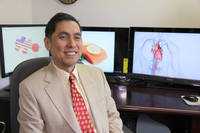23 Feb Cardioprotective Effect of Soy in Japanese May Be Mediated Through Equol
MedicalResearch.com Interview with:
Akira Sekikawa, Ph.D.
Associate professor of epidemiology
University of Pittsburgh Graduate School of Public Health
MedicalResearch.com: What is the background for this study? What are the main findings?
Response: We found that Japanese men who are able to produce equol—a substance made by some types of “good” gut bacteria when they metabolize isoflavones (micronutrients found in dietary soy)—have lower levels of a risk factor for heart disease than their counterparts who cannot produce it. All monkeys can produce equol, as can 50 to 70 percent of people in Asian countries. However, only 20 to 30 percent of people in Western countries can.
Scientists have known for some time that isoflavones protect against the buildup of plaque in arteries, known as atherosclerosis, in monkeys, and are associated with lower rates of heart disease in people in Asian countries. It was surprising when a large trial of isoflavones in the U.S. didn’t show the beneficial effects on atherosclerosis.
My colleagues and I recruited 272 Japanese men aged 40 to 49 and performed blood tests to find out if they were producing equol. After adjusting for other heart disease risk factors such as high blood pressure, cholesterol, smoking and obesity as well as dietary intake of isoflavones, we found that the equol-producers had 90-percent lower odds of coronary artery calcification, a predictor of heart disease, than the equol non-producers.
MedicalResearch.com: What should readers take away from your report?
Response: Our discovery about equol may have applications far beyond heart disease. We know that isoflavones may be associated with protecting against many other medical conditions, including osteoporosis, dementia, menopausal hot flashes, and prostate and breast cancers. Equol may have an even stronger effect on these diseases. However, I do not recommend that people start taking equol to improve their heart health or for any other reason unless advised by their doctor. Much more study is needed.
MedicalResearch.com: What recommendations do you have for future research as a result of this study?
Response: We are pursuing funding for a much larger observational study to expand on our findings and eventually a randomized clinical trial to examine the effect of taking equol on various medical conditions and diseases.
MedicalResearch.com: Is there anything else you would like to add?
Response: Additional authors on this research include lead author Vasudha Ahuja, Ph.D., of Pitt Public Health; and co-authors Katsuyuki Miura, M.D., Ph.D., Akira Fujiyoshi, M.D., Ph.D., Maryam Zaid, Ph.D., Naoko Miyagawa, M.D., Ph.D., Aya Kadota, M.D., Ph.D., and Hirotsuga Ueshima, M.D., Ph.D., all of Shiga University of Medical Science in Japan; Abhishek Vishnu, M.D., Ph.D., and Rhobert Evans, Ph.D., both of Pitt Public Health; Takashi Hisamatsu, M.D., Ph.D., of Shiga University of Medical Science and Shimane University in Japan; and Tomonori Okamura, M.D., Ph.D., of Keio University in Japan.
This research was funded by National Institutes of Health grant R01 HL68200, Japanese Ministry of Education, Culture, Sports, Science and Technology grants B16790335 and A13307016, and a small grant from Pitt Public Health’s Department of Epidemiology.
MedicalResearch.com: Thank you for your contribution to the MedicalResearch.com community.
Citation:
Note: Content is Not intended as medical advice. Please consult your health care provider regarding your specific medical condition and questions.
More Medical Research Interviews on MedicalResearch.com
Last Updated on February 23, 2017 by Marie Benz MD FAAD

